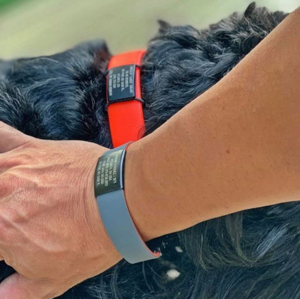Brain Injury Awareness Month continues! As equestrians, it’s absolutely vital to protect our melons while working with and around our horses. Even a friendly hello “bop” from your gelding’s nose can throw you off-balance, after all.
I was pondering the importance of someone at your barn having your basic medical information on file most recently because a lot of my medications have changed in the past couple of months. Many of them conflict with other drugs that may need to be used to revive me in an accident. Some even conflict with basic medications that an emergency room might administer if, say, my blood pressure crashes. For instance, one of the prescriptions that I’m on is technically a blood pressure control drug, but it’s used to help control anxiety and PTSD. If an ER doctor wasn’t aware that I was on that drug, administering another one up that little IV might end in an adventure.
I also was thinking about someone knowing where your medical information is at the barn, OR carrying your medical information (including any allergies) because I am actually the only client at my barn who doesn’t “fly south” for the winter. Our other boarders and head trainer head to WEF each winter and return right after it ends, in early April. My mare and I stay home, along with a few other horses and a cute but feisty pony. Our barn manager stays home, as well – he’s the only staff we have on-site during the winter. It’s pretty nice not having to worry about accidentally running into anyone else in the ring, and I do enjoy the quiet.
If anything should happen, however, especially with our nasty Illinois weather that can cause our horses to turn into giant, reactive squirrels…should I be knocked out, it’s our barn manager who would stumble upon the fun and need to call an ambulance. He would also need to provide a medication list as best as he could. I gave him a basic list of prescriptions with dosages a few days ago; he saved it in his phone (with no judgement!) in case anything does happen – because hey, it’s horses. Once the rest of the barn family returns home, I’ll provide my trainer with a list, as well.
I also wear a medical bracelet when I ride and especially when I horse show – or trail ride off on random safaris to visit the cows next door. I used to wear my old eventing armband but started to find it a bit clunky and good at collecting sweat.
Instead, I absolutely love the medical bracelets by Road ID. They are actually affordable and come in different widths to suit tiny, medium, or large wrists. The colors are nearly limitless, and the informational nameplates are incredibly easy to customize. Fortunately or unfortunately, when my emergency contact changed after a breakup about one year ago, I was able to replace just the informational nameplate and reattach it to the wristband itself. Done. The nameplates can also be attached to an Apple watch, dog collar…you name it.
Road ID bracelets start at $19.99 and are available here. I smashed all of the following information onto mine:
- Full name
- Most important medical conditions
- Most important prescriptions
- Allergies (latex)
- Parents’ contact information
If you want a truly “equestrian” bracelet, Ride Safe makes bracelets that you can add your discipline badge to, and even bling it out with Swarovski crystals. You can also register for inclusion in Ride Safe’s electronic database. A paramedic can look up the ID number on your bracelet and gain access to a full medical profile. Personally, when I owned a Ride Safe bracelet, I was never in a situation where anyone needed to tell the paramedic to look up the ID number; it seems like a bit of an extra step.
Ride Safe bracelets start at $31.95 and are available here.
Is your emergency info stored somewhere?
Go Jumping!



